When discussing best-value VPNs, it’s impossible not to mention Private Internet Access. This affordable provider packs quite a punch, offering a staggering number of security features coupled with private-friendly logging practices. Is Private Internet Access as secure as it claims to be, though? How safe is PIA VPN and is it legit? Well, in today’s analysis, we will answer this question and analyze the provider in terms of security and privacy in-depth.
We’ll see if PIA VPN is a scam, how safe and reliable it is, and whether or not you should even bother with it. If you’re in doubt about whether or not to purchase it on account of security/privacy only, this is an article for you. Keep reading to find out more!
Is PIA VPN Safe to Use? Security Features Examined
As always, we’ll start this security analysis by talking about its security features. These are passive and active security features that you can find within the app.
Bank-Grade Encryption
As is the case with every premium service, you can expect Private Internet Access to use bank-grade encryption. Now, you might wonder what exactly is bank-grade encryption in the first place. To be precise, it’s another name for 256-bit AES encryption.
Its name implies that it’s used by the banks but also by the military to protect confidential data. PIA VPN lets you choose from several levels of encryption, however. Thus, you can use 128-bit encryption if you want, which will produce a tad faster speed at the cost of security.
By default, however, you can expect 256-bit AES encryption, as explained in our PIA VPN review.
Kill Switch
The kill switch that PIA VPN offers is awesome. Is Private Internet Access safe to use in terms of connection stability? Absolutely! Even though you’ll experience disconnects very rarely, its kill switch will immediately react if this happens.
It’ll shut down all traffic to prevent your IP from leaking. Even better is that this is a so-called advanced kill switch. This means it will protect your data from leaking even when you’re disconnected! In other words, it won’t allow you to go online without the VPN enabled.
You’ll find this useful in censored counties or locations where ISP surveillance is prevalent and you want to ensure privacy every time you go online.
PIA MACE
PIA MACE sounds like a big medieval weapon – after all, it’s MACE – a weapon used for smashing your enemies’ heads. While Private Internet Access won’t smash your head, it will block ads, malware, and malicious sites thanks to this feature.
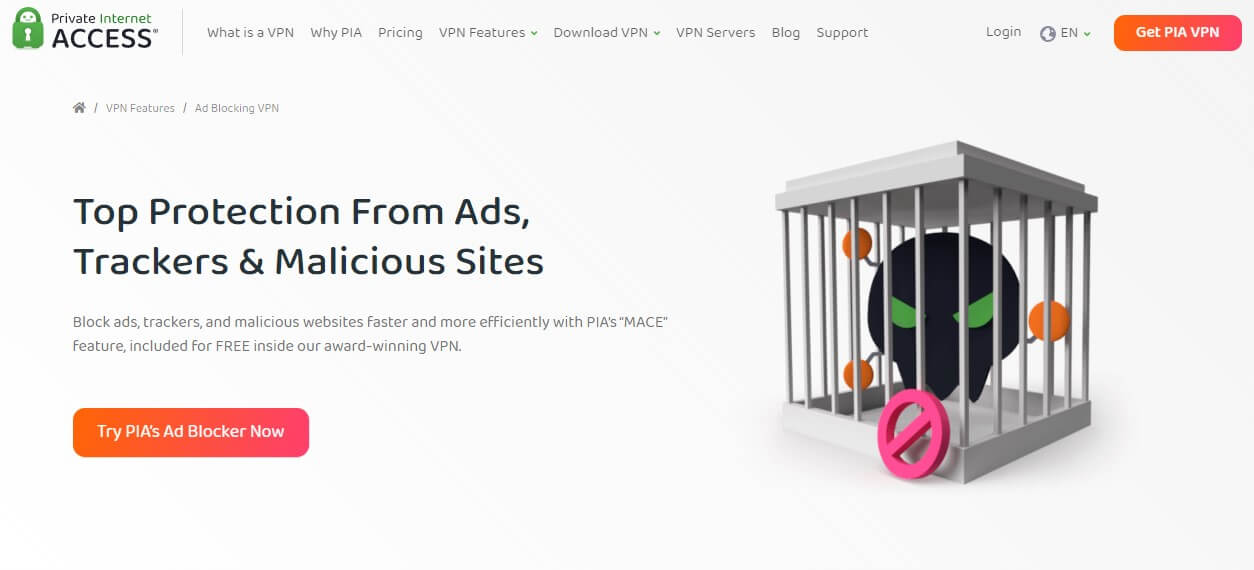
It’s a neat security addition that you can enable with a click of a mouse. Once that is done, the ad-blocker is activated and you can go on the internet knowing that no malicious entities can harm your computer or steal your data.
We tested it many times, albeit, we found that the ad blocker in a VPN like CyberGhost works a bit better. Or perhaps, NordVPN’s Threat Protection, which also has an antivirus included.
WireGuard Support
Security protocols that Private Internet Access offers are numerous. PIA VPN is safe and secure and definitely not a scam – far from it. Besides, it has a well-known OpenVPN solution, coupled with IKEv2 and WireGuard.
IKEv2 is meant for iOS since it can’t use OpenVPN. However, all other platforms support WireGuard and OpenVPN, which we found handy. OpenVPN will provide excellent security with moderate speeds, making it not the best option.
WireGuard bumps up the security and increases the speed, which makes it a far better choice. Additional customization options are here for each protocol. You can, for example, choose the MTU size, configuration method, and even the port you’re going to use.
For OpenVPN, you can change the level of encryption as well. Beware that IKEv2 isn’t available on Windows, though. But with OpenVPN and WireGuard, you won’t miss it,
MultiHop
If you’re still wondering whether is PIA VPN safe to use, we need to mention a few more features. MultiHop is one of them and it works really well. It’ll route your traffic through two servers, giving you two IP addresses and another layer of encryption.
Private Internet Access lets you choose both servers, on top of that, so the feature is fully customizable. This feature, while handy for adding a higher level of security, isn’t going to give you the best performance. After all, there are two layers of encryption, which ends up being resource-taxing.
IP/DNS Leak Protection
Needless to say, IP and DNS leak protection make its return here. The kill switch will ensure your IP won’t leak, while DNS leak protection is done through the provider’s proprietary DNS server. It’s used to handle your DNS requests and prevent your ISP from doing that.
Since PIA uses a no-logs DNS server, neither of your valuable information is collected. In addition, you’ll never leak your native DNS address, which we proved near the end of this analysis.
Shadowsocks & SOCKS5 With Obfuscation
Obfuscation is one of the main features of VPNs for China. It will make your VPN traffic look like ordinary traffic, allowing you to get over firewall restrictions. Private Internet Access won’t work in China like Astrill VPN, though.
However, you can still bypass most other firewalls without issues. This feature is combined with MultIHop and Shadowsocks. Users can also use a SOCKS5 proxy in addition, which will allow for additional security, especially when torrenting
Antivirus
The last feature we want to talk about is antivirus. Yes, it’s an antivirus by PIA and an optional addition to your VPN subscription. This antivirus is extremely affordable, especially if you choose the cheapest, 3-year plan that many users go for.
In this case, PIA antivirus will cost you just $1 a month on top of the subscription. Yet, it works really well and can eliminate at least 95% of the viruses stored on your computer. Even its monthly price of $4.50 is pretty attractive for what you get.
The antivirus included here works the same as the one from CyberGhost, for instance. This will ensure you gain 360-degree protection from various cyber threats while streaming, browsing the internet, torrenting, or going on the dark web.
Does PIA VPN Store Logs? Analysis of Its Privacy Policy & Jurisdiction
Is Private Internet Access a scam after everything we said? Obviously not. It’s a safe and secure VPN that offers a few more features we haven’t addressed. Some of them include split tunneling, dedicated IP, and connection automation, neither of which is particularly relevant to this analysis.
However, the thing that’s relevant is the privacy policy. Does Private Internet Access VPN store logs? Let’s find out together.
Where Is the Company Based?
First of all, the company is based in the US – a bad start. The US jurisdiction is one of the worst. It’s a 5 Eyes country known for ISP surveillance, data collection, and global espionage. Many US-based VPNs are notorious for data leaks and cooperation with the authorities – an interesting bit of information.
IPVanish and Betternet are some of them. On the other side, we have PIA VPN with a no-logging policy proven in court several times. In fact, this is one of the safest VPNs your money can buy, as it NEVER had any scandals related to data leakage or handing out user-related data to the authorities.
Is PIA VPN Safe in Terms of Logging Practices?
As said, you can expect a stringent no-logging policy in spite of its US jurisdiction. This company is a subsidiary of Kape Technologies that also owns ExpressVPN and CyberGhost.
Yet, these two services are two textbook examples of great no-logging services.
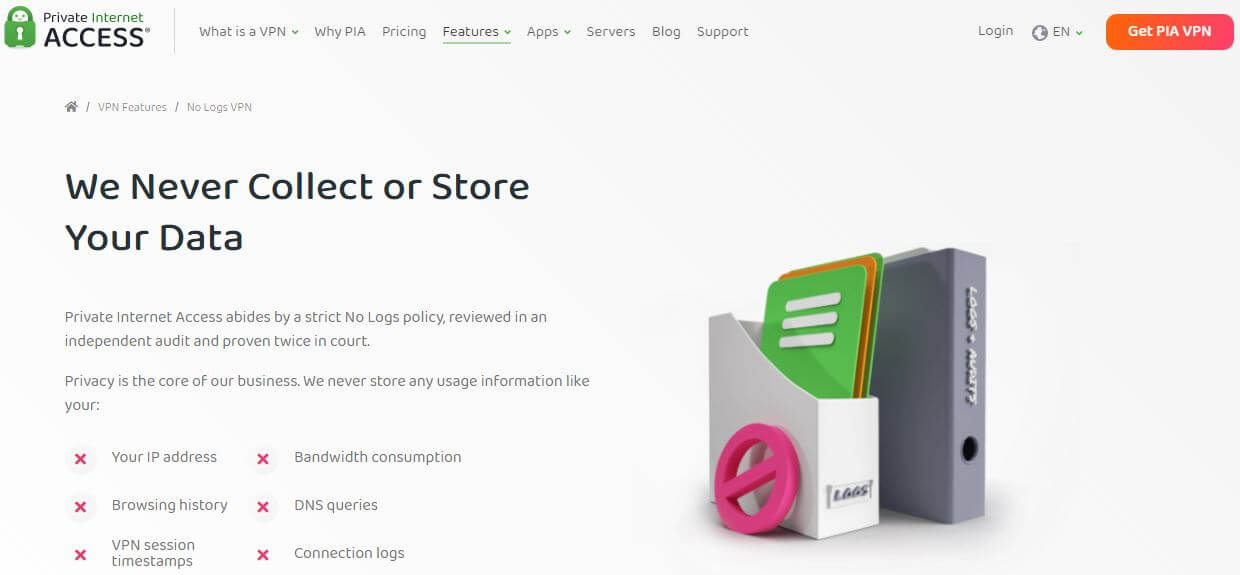
For the start, the company won’t store any info related to your IP address, bandwdith consumption, browsing history, DNS requests, connection logos, and VPN session timestamps. With this information unavailable to the company, it can’t identify you or track you online.
Moreover, the provider uses RAM-only servers. With each server restart, every bit of data is lost, as RAM stores data only while the power is ON. When it’s off, it loses all data. This is how ExpressVPN’s servers work as well, which is why it’s so secure.
In terms of storing logs, PIA VPN is very privacy-friendly. Sure, it stores your email and payment data but this is normal if you want the service to function. Some anonymized data should also be mentioned but this data is used for troubleshooting if you experience any issues.
The site uses cookies that will track your activities only on PIA’s website – something that all websites do. However, when it comes to knowing a single thing about your online footsteps, believe me, Private Internet Access is completely unaware.
Third-Party Audits
To make things far better, Private Internet Access decided to undergo a third-party audit. Deloitte, the company that audited NordVPN and Surfshark, also worked on PIA VPN. It examined every part of the VPN’s infrastructure to find potential vulnerabilities.
The results were phenomenal. PIA VPN was indeed safe and secure, but also very reliable in keeping your data private. Its no-logs policy was also a part of the auditing process, where the company proved its strong adherence to it by not storing any user-related logs.
IP & DNS Leak Tests: Let’s See if There’re Any Leaks
Before we conclude this analysis, it’s time to go through our mandatory IP/DNS leak test procedure. At the time of testing this provider, we were located in Belgrade, which you can see below.
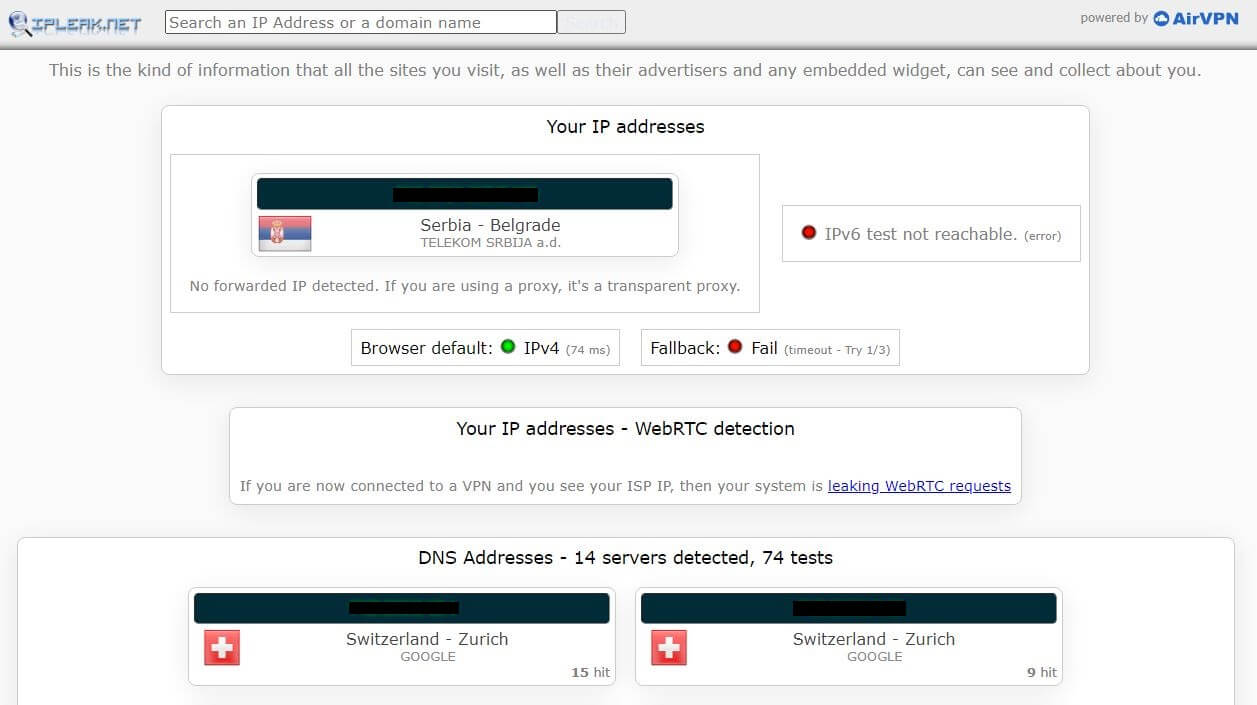
We blurred our IP/DNS addresses for privacy reasons, though. However, you can see that we used the site called ipleak.net to do our tests. Then, we connected to the US server from PIA VPN and tested it on the same site, but also the site called browserleaks.com.
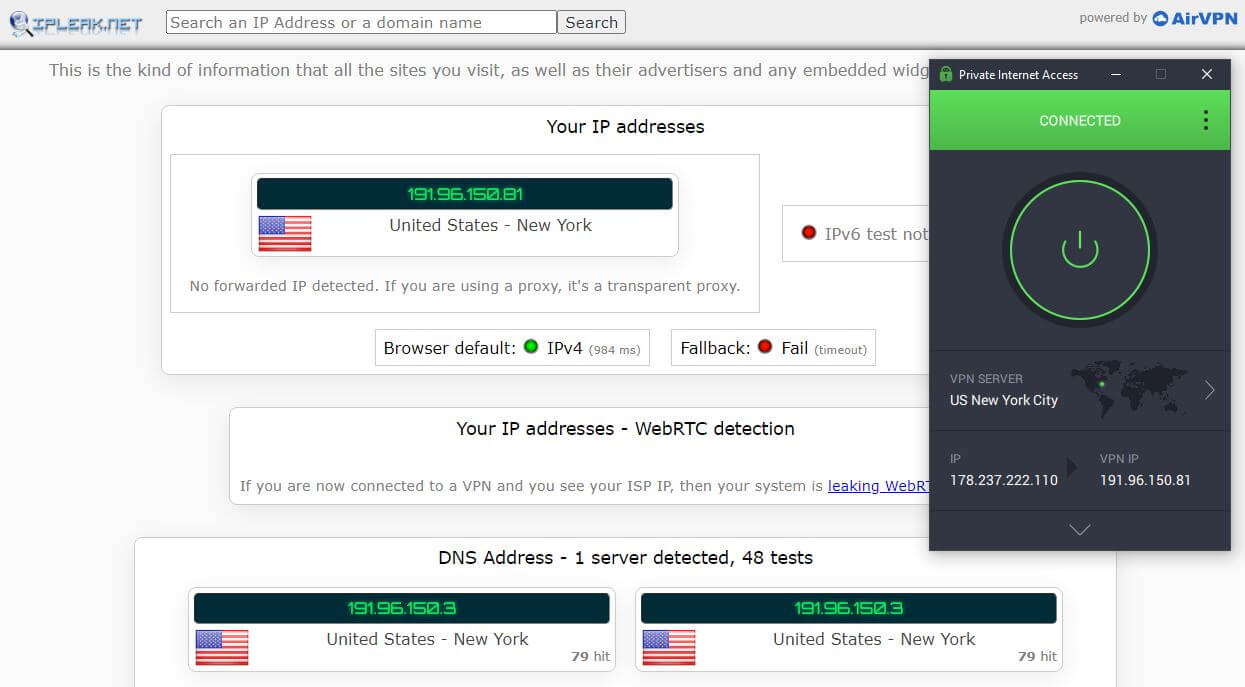
The first site, as expected, showed excellent results. All our IP/DNS addresses are in the US, implying that the VPN fully protected our online privacy. No wonder many people use it to safely browse the dark web and download torrents.
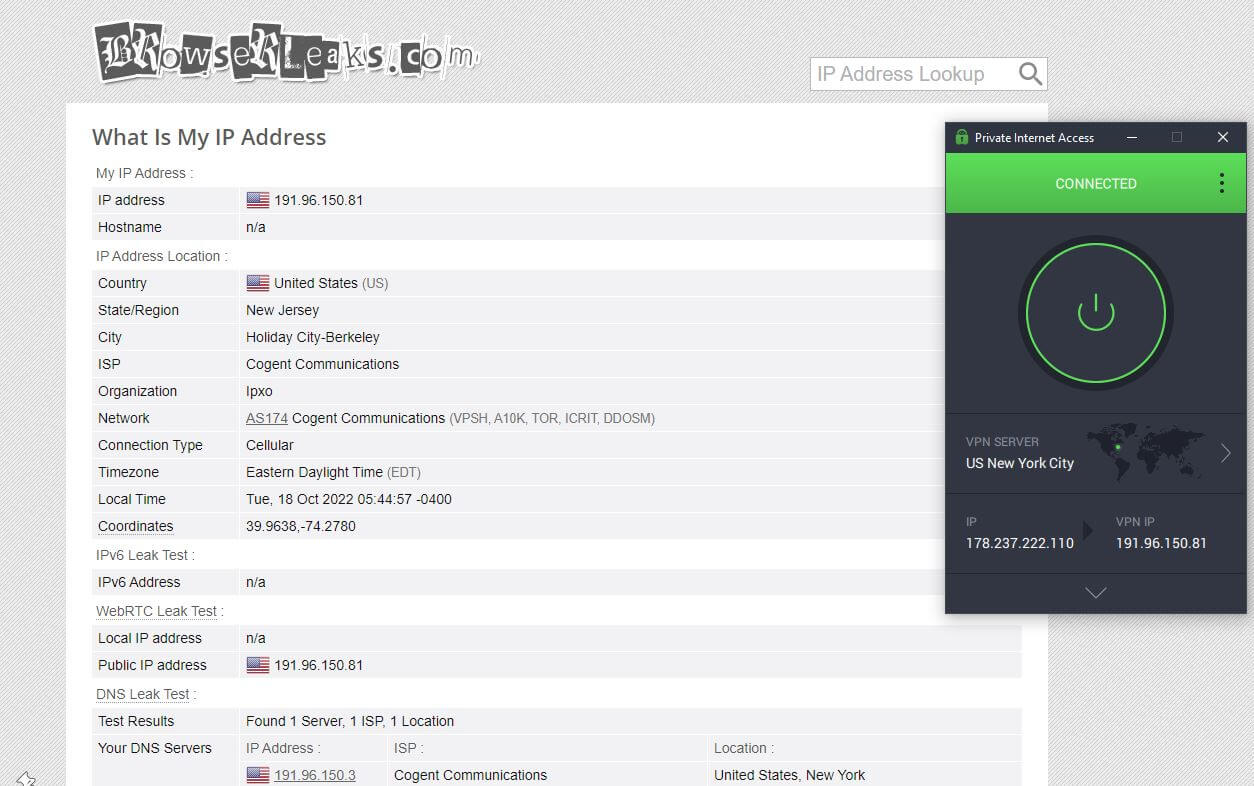
Moving on to browserleaks.com, we get the same result. Once again, our IP is in the United States, and so is our DNS address. More impressively, the second screenshot shows us that we also don’t have WebRTC leaks, which are typical for Chrome that we used here.
That said, Private Internet Access is reliable even for keeping WebRTC leaks out of your way.
So, Is Private Internet Access VPN Safe to Use?
Okay, so finally, is Private Internet Access safe and secure? Obviously, the answer is positive. We’re talking about a highly-reliable service that will do an amazing job at ensuring your privacy and security online. Although it’s not our #1 choice like ExpressVPN, it’s up there with the greatest VPN services.
If you ask us about the reason for buying PIA, it would be exactly this one. Some other benefits include P2P-optimized servers, 30,000 servers around the world, 10 simultaneous connections, 24/7 support, and very affordable prices.
People interested in PIA can get it through the button above. This way, they can claim an exclusive discount through 01net, save quite a bit of money, and even get a 30-day money-back guarantee as a failsafe option in the case of dissatisfaction.